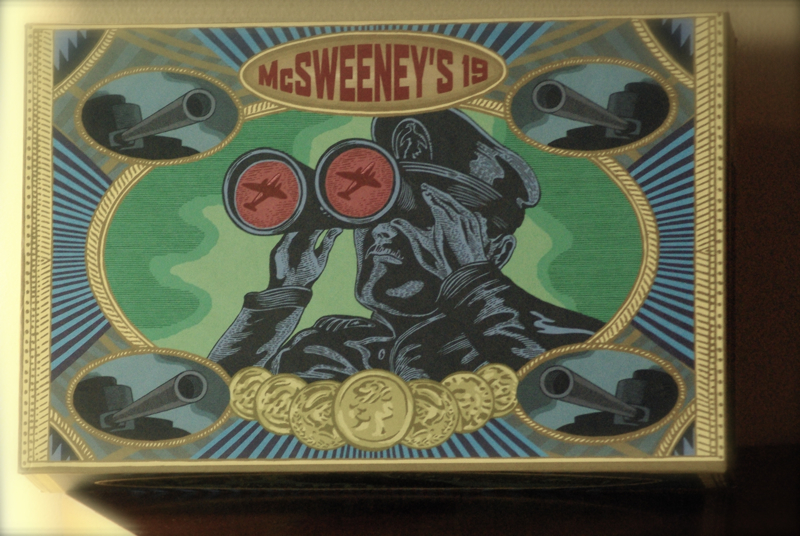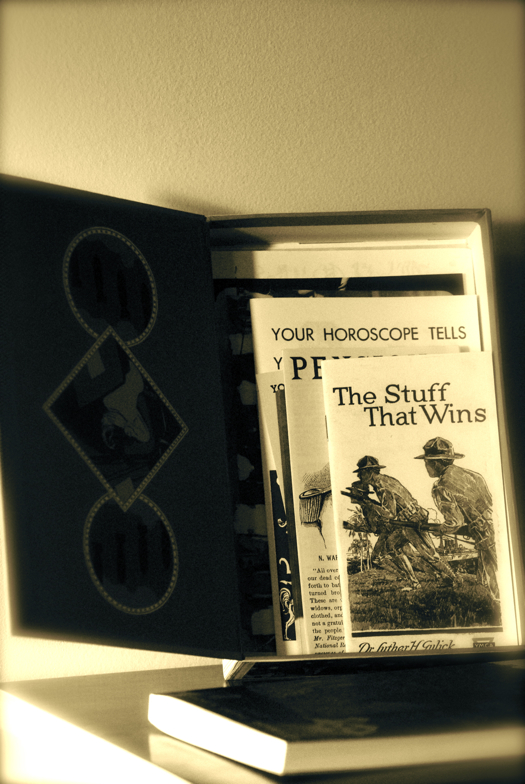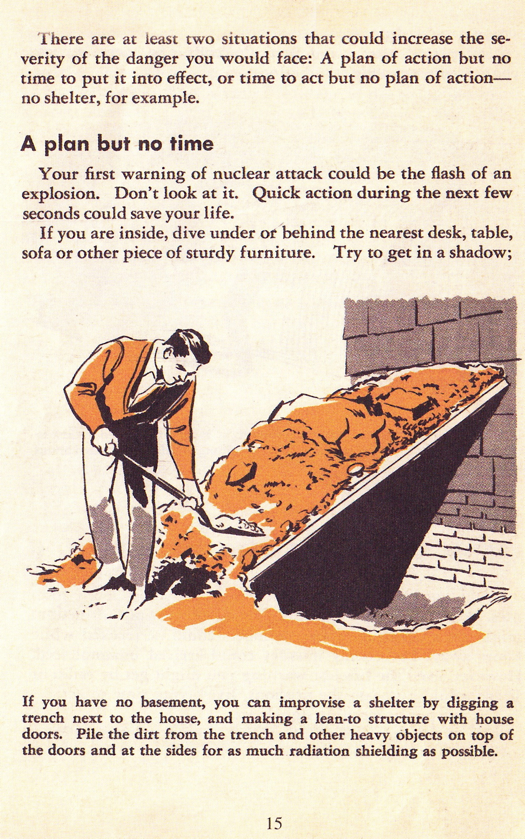After a couple of disappointing reads I was in dire need of a palate-cleanser, something light and distracting and candy-like that would be fun to breeze through. I've had this delightful collection of historical ephemera, otherwise known as McSweeney's #19, hanging around the to-be-read shelf for quite some time, and figured it was just what the doctor ordered. Those folks at McSweeney's sure know how to put together an appealing package: housed within this vintage-inspired "cigar box" is not only the standard paperback literary periodical one would expect, but a whole collection of pamphlets, photographs, battle plans and informational circulars associated with wartime and politics throughout American and British history.
These are reproductions of actual pamphlets, letters, and so on, which make give them that special "artifact" feel. I find it's hard to resist a curated exhibition of primary-source documents - especially ones so hilarious and heartbreaking. One of my favorites is a pamphlet, apparently circulated by the Nixon/Agnew campaign to their female supporters, entitled "Your Horoscope Tells You How You Can Help Republican Party WIN!" In addition to the Cro-Magnon-esque syntax of that title, it features stunning pieces of advice like this one (to the Cancer lady):
You can turn chaos into order, especially in the filing drawers. You'll be effective on the telephone, too...
Or this, to the Leo Nixon supporter:
Try to invade the camp of the opposition and go after the opposite sex in the crowd; they'll buy Nixon/Agnew all the way! One word of warning: the most important feature of this campaign is teamwork. It may kill you, but COOPERATE.
Awesome. So, what's your poison: secretary or prostitute? Either way, Nixon/Agnew wants YOU on board this November.
Also included in the menagerie of political detritus is an incredibly jingoistic WWI-era pamphlet that tries to prove "scientifically" why soldiers shouldn't drink, gamble, or sleep around ("The other nations say that our boys win because we make a business of it, that we go at it hard and drop everything that interferes. I guess they are right."); a pamphlet by a Civil War-era ambulance chaser working to extend veterans' pensions; a 1957 pocket guidebook distributed by the US Marine Corps to servicemen stationed in the Middle East ("As an American you will not be a stranger in the Middle East. Even though you may occasionally find some antagonism, a reservoir of good will toward us has been developed over the years."). And check out this amazing illustration, part of a brochure distributed by the Department of Defense in 1961 on what to do in the event of nuclear war. Dude's gonna weather the fallout from a 5-megaton blast under a FRONT DOOR PILED WITH DIRT, tipped against his house. The mind reels.
Imagine having seen photos of the nuclear wreckage at Hiroshima, and then receiving this brochure in the mail and reading advice like "Farm machinery, troughs, wells, and any produce you cannot get into barns should be covered with tarpaulins." Tarps. Excellent.
I found the stories in the actual bound-and-printed portion of #19 less remarkable than the fascinating first-hand flotsam that accompanied it. The high point, by far, was the T.C. Boyle novella Wild Child - a fictionalized (although very true to history) account of the relationship between the 18th-century Wild Boy of Aveyron and his would-be mentor and civilizer, Jean Marc Gasapard Itard. I was actually just reading about Victor of Aveyron last February (bizarre coincidence), as part of a nonfiction study of feral children and their discoverers. Interestingly, Boyle's novella was effective for the very reason I felt the nonfiction book fell flat: in most cases, there is no direct evidence of the subjective experience of these feral children, because most of them never acquire language (sadly, most of them die within a few years of being "discovered"). So Michael Newton's nonfiction treatment ended up being, in actuality, a history of the people who worked with these children, who tried, usually unsuccessfully, to break them of their "uncivilized" ways and make them into "productive members of society." Newton examines the struggles and motivations these scientists and social workers faced. Which is kind of interesting, but not nearly as interesting as the question of what the experience is like for the children themselves: something Boyle, because he's working with fiction and his imagination, can explore.
Did he somehow come to understand that people were his tribe in a way that a bear instinctually consorts with other bears rather than foxes or wolves or goats? Did he know he was human? He must have. He had no words to form the proposition, no way of thinking beyond the present moment, but as he grew he became less a creature of the forest and more of the pasture, the garden, the dim margin where the tress and the maquis give way to cultivation.
This was actually my first exposure to Boyle (I know; where have I been? chock it up to my resistance to the authors "everyone's reading"), and I quite liked him. Apparently, "Wild Child" is an excerpt from his 2006 novel Talk, Talk, which is intriguing to me since I hear the primary plot concerns credit card fraud - not exactly what you expect to see paired with 18th-century France. Do any Boyle fans out there have a recommendation for my first full-length novel by him? I'm a little resistant to reading The Women, despite its beautiful cover, but other than that I'm open.
In any case, a romp through wartime McSweeney's-land was exactly what I needed to get my reading back on track. Next up: W. Somerset Maugham's Of Human Bondage!
(Want your own cigar box of fascinating wartime ephemera? Number Nineteen is on sale right now from the McSweeney's store for only five dollars, which is significantly less than I paid for it. Makes a great gift!).





Yes, yes, read "Talk Talk"! I love Boyle, but one reason why I love this book is because the main character, who is deaf, is such a strong person. It's not often that I see hearing impaired characters portrayed in a good way. I've been meaning to re-read it soon because I had read it pre-blogging, and have wanted to have a review of this book on my blog. Would really like to know what you think of it.
I do want to read "The Women" to compare it to "Loving Frank" by Nancy Horan but am waiting for it to be out in trade paperback (should be soon...if not already...I should check).
Bah, today was going to be a day where I DIDN'T spend money...! But McSweeney's is too much fun. Oh well, delicious packages coming my way is never a bad thing. Thanks for the tip. I haven't read any Boyle either - I'm interested in what will be recommended to you. :)
What a fun box! Too bad we seem to have used up that reservoir of good feeling in the Middle East! My husband was born in 1964 and remembers in elementary school having nuclear bomb drills in which they all protected themselves by huddling under their flimsy school desks. The brochure reminds of the government after 9/11 suggesting that we could all protect ourselves from a biological warfare attack by duct taping our windows and doors.
The only Boyle I have read is the one about Kellogg and it was so long ago I don't remember the title. It was good though.
Valerie: Oh, great tips on Talk, Talk! You make it sound very appealing - I'll have to check it out. I know what you mean about the pre-blogging reads...I have a whole pile I'd like to return to.
Sarah: Haha, well at least their sale makes their back issues super-affordable right now! :-)
Stefanie: I know, isn't that a heartbreaking sentence about the Middle East? My mom's elementary school class apparently went outside for nuclear attack drills, which totally breaks my brain. I guess the "logic" was that you were supposed to put your head against a corridor wall, and there were no corridors (she grew up in Hawai'i, where all the buildings were constructed around outdoor courtyards). SO CRAZY.
I don't think I've seen any of the McSweeney's stuff before, Emily, but I love that packaging at least. Too bad the theme couldn't have been Wild Boys instead of wartime politics, though!
Ooh Richard, if you haven't discovered McSweeney's yet, you have some enjoyable packaging-coveting ahead of you. :-) My favorite issue of theirs I've read is the Icelandic one.
How interesting! I had no idea McSweeney's put out such varied material! It's fascinating and horrifying both to read advice books and other kinds of nonfiction aimed at women -- oh, the things they so easily assumed!
Enjoy Boyle. I've never read him himself, so you are not alone there ... well, you're ahead of me at this point.
Not a big war person myself but I love Art Nouveau and Art Deco design, which appears on a lot of twentieth-century ephemera. That box looks like a lot of fun!
Emily, I think that you already know what a McSweeney's junkie I am. Am patiently waiting for this:
http://www.chroniclebooks.com/index/main,book-info/store,books/products_id,8623/title,Art-of-McSweeneys/
Such a design aesthetic! And I have already plunked down my unbelievably dinky sum of $5 down for this set here. Primarily for the T.C. Boyle whom I also love. Have had The Women for months and still have not gotten to it because I am more a fan of his short fiction which is what I would recommend to you. He has such a talent for propelling the trajectory of an idea forward through a distinctive usage of commas alone.
Dorothy: So true about the advice aimed at women. What really blew my mind about that Nixon/Agnew thing is that they were a political campaign - so, at the forefront of trying not to piss people off. Yet still - the condescension. Ah well.
EL Fay: I'm actually not hugely into war stories myself, but I think the firsthand nature of the ephemera here added a degree of interest that's usually absent for me.
Frances: Oh wow, that design book looks a-maaaaz-ing...! And good tip about the short fiction. That's a genre of which I'm trying to build an appreciation anyway, so maybe I'll check out one of his story collections.
I've never heard of this either, but it looks like fun!